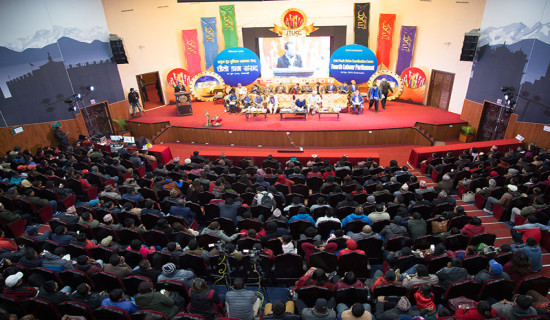- Wednesday, 9 July 2025
'68 per cent of people above the age of 30 experience some kind of sexual dysfunction'
By Mahima Devkota, Kathmandu, June 16: Nepal records 68 per cent of people above the age of 30 who experience some kind of sexual dysfunction.
Unveiling the first-ever national study on sexual dysfunction in Nepal conducted by the Society for Local Integrated Development Nepal (SOLID Nepal), with technical support from the Family Welfare Division, Department of Health Services, and UNFPA, in the program organized here today, Principal investigator of Nepal National Sexual Dysfunction Study, 2024, Dr Khem Raj Karki, said that sexual dysfunction is prevalent more among male than females, that is, 72.2 per cent of men and 67 per cent of women, in average, 68 per cent of people, above the age of 30 experience some form of sexual dysfunction.
He said, "Understanding and researching sexual dysfunction and reproductive health is crucial; however, it is a less-walked path so far in Nepal. I hope that this research will contribute to policy making regarding sexual health."
Geographically, the highest male sexual dysfunction has been observed in the Karnali Province, standing at 82. 4 per cent and female in Madhesh Province at 72.6 per cent. In contrast, the lowest sexual dysfunction in males is observed at Madesh Province at 64.1 per cent, and the Lowest in females is in Lumbini Province at 40.8 per cent.
The study shows that in Nepal, five per cent of affected men reported severe dysfunction, while 32 per cent experienced moderate symptoms. Approximately 84 per cent of men with dysfunction reported an inability to achieve sexual satisfaction through intercourse. Notably, 92 per cent of men and women experiencing dysfunction reported a complete lack of sexual desire, pointing to underlying psychosocial and physiological conditions.
Among women, 94 per cent reported an absence of arousal, 86 percent experienced vaginal dryness, and 66 per cent reported pain during intercourse. Alarmingly, even when sexual activity occurred, three out of four women reported being unable to reach orgasm.
Dr Karki said, "The study highlights a strong link between sexual dysfunction and early marriage, sexual dysfunction and chronic non-communicable diseases, sexual dysfunction and obesity, sexual dysfunction and dietary. Early Marriage appears to be a significant risk factor: individuals married before the age of 18 were more likely to report dysfunction (68 per cent) compared to those who married after the age of 25 (61 per cent). Similarly, diet and nutrition emerged as influential variables—respondents who consumed fewer fruits and vegetables reported higher rates of dysfunction (68 per cent) compared to those with more nutritious diets (65 per cent).
He said that lifestyle factors such as substance use also presented a clear association. Among individuals who had used tobacco extensively before quitting, 80 per cent reported sexual dysfunction. Among alcohol users, the rate was 69 per cent, compared to 59 per cent among non-users. Other contributing factors include obesity, hypertension, and elevated blood glucose levels. The study highlights a strong link between sexual dysfunction and chronic non-communicable diseases such as diabetes and cardiovascular conditions.
Kidney Transplant Surgeon at the Institute of Medicine (IOM) Dr Bhoj Raj Luitel, said that andrology needs to be integrated in the health care system to ensure that men live a healthier and happier life.
Representative of the UNFPA Won Young Hong said that it is about time to remove the stigma related to male sexual and reproductive rights.
Dr RP Bicchha of the National Planning Commission assured to integrate male sexual health into policy.
Director of the Health Services at the Ministry of Health and Population Dr Bibek Kumar Lal, said that this research will pave the way for the inclusion of male sexual issues into policy.
Stress, separation, busy schedule, family dispute, marital dispute, work-life imbalance, infection, poor health of a partner, and psychogenic factors are some of the factors contributing to sexual dysfunction, as per the study.





-square-thumb.jpg)





-original-thumb.jpg)


